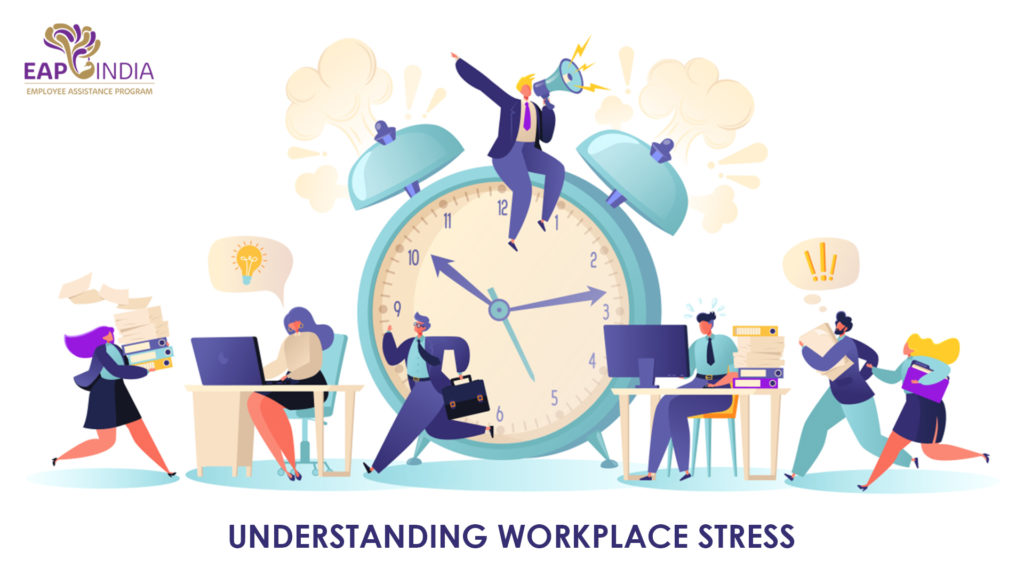What Is Stress?
Stress is defined as adverse reactions people have to excessive pressures or other types of demand placed on them. Some amount of stress if okay; it keeps people motivated and gives them a sense of ambition.
Stress is not an illness, but the psychological impact can lead to conditions such as anxiety and depression which may result into heart disease, back pain or skin conditions.
What Is Workplace Stress?
Job stress should not be confused with challenges which motivate the employees to learn and master their newly acquired skills. When too much work occurs rapidly and in large amounts, mental and physical health can be negatively affected.
Causes Of Stress At Workplace:
- Job Insecurity: With the present economy being uncertain and high competition among organizations create a fear for the employees of losing their present jobs and trying to fulfil all expectations of the company. Thus, pressure of performing also increases.
- Workload: This is the most obvious stressor in workplace.
- Overload: Most organizations have deadline-driven assignments and high-quality expectation from its employees making them frustrated with work overload and no time to rest.
- Under Load: When an employee receives less work assignments as compared to the rest of their team or from their team manager, they question themselves about their capabilities and their capacity for hard work causing them stress.
- Lack Of Training And Resources: Recruiting employees with adequate quality skills is beneficial for both the organization and the employee as well. But when an employee working on a certain task doesn’t qualify with the exact job requirement, the stress level become high and the performance of the person goes down.
- Managerial Style: Some managers are of an understanding nature whereas there are some who are controlling of every situation that occurs within their presence in the organization. Dominating managers give very little freedom to their employees when it comes to decision making. Employees working under a dominating manager hardly have any control over their work and very high restrictions.
- Working Hours: Extended and odd working hours lead to major physiological problems in employees leading to high stress levels during work. People who work in shifts also have imbalance in their sleep cycles.
- Organizational Change: Any form of change within the organization is difficult to cope up for employees. It creates a sense of fear and stress for employees if the changes taken place aren’t managed well. Organizational changes like changes in the structure, process, team members, cultural or work environmental changes.
- Conflict: Conflicts or unnecessary arguments among the team members create a drift within the team. This can lead to experiencing stress at the workplace.
- Personal Problems: Personal and family problems often distract a person’s mind from concentrating on work related tasks. It creates a sense of stress in an employee who may already be overburdened with their workload. This is a common cause of stress at workplace.
- Workplace Harassment: Any type of harassment be it verbal or physical harassment in the workplace can lead to increase in the stress levels of both the organization and the employee.
- Poor Working Relationships: Sometimes misunderstandings create a rift between the team members. A company should be able to promote positive behaviours at work to avoid conflict and ensure fairness.
What Are Some Of The Physical, Physiological And Psychological Symptoms Of Stress?
Knowing symptoms of stress is helpful for the employee to understand about the next step. Following are some symptoms of stress that are visible and can be felt:
- Headaches; Different types of headaches
- High Blood Pressure
- Insomnia
- Procrastination
- Trouble concentration
- Indigestion
- Apathy
- Social withdrawal
- Anxiety and depression
- When you feel overwhelmed at work, you may lose your confidence and may become angry, irritable or withdrawn.
Why Should An Employee Try To Reduce Their Stress?
Reducing work-related stress is beneficial to the employer and the organization for a number of reasons, some of which are mentioned below:
- Making staff healthier and happier at work
- Improving their work performance and overall staff productivity
- Reducing absenteeism
- Reducing workplace disputes
Conclusion
Stress is one of the most daunting obstacles to employee engagement in the modern workplace. Stress can affect the health of staff members; it can reduce their productivity and lead to performance issues. In the workplace, employee-environment fit should be the primary focus. Whatever your work demands, there are always steps that you can take to protect yourself from the damaging effects of stress, improve your job satisfaction, and bolster your well-being on and off the job.




